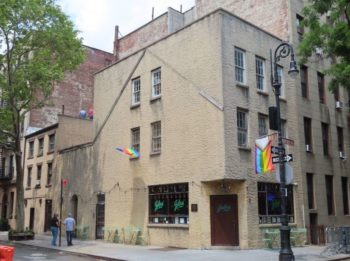
Julius’ Bar. Image Credit: LPC.
Located at the corner of West 10th Street and Waverly Place, Julius’ holds great significance in NYC’s LGBTQ+ history and is undergoing Individual Landmark consideration. On November 15, 2022, the Landmarks Preservation Commission held a public hearing to discuss landmarking Julius’ Bar, located at 159 West 10th Street in Manhattan. The building was previously calendared for Individual Landmark consideration on September 13.
The public hearing began with a presentation from Kate Lemos McHale, Landmarks’ Director of Research. McHale described Julius’ Bar as “New York City’s most significant site of pre-Stonewall LGBTQ activism.” In 1966, three years before the Stonewall Rebellion, four activists with the Mattachine Society held a “Sip-In” at Julius’ Bar to protest the closure of restaurants and bars serving queer people. Modeling this direct action after the Civil Rights Movement, the Sip-In showcased the frustration and bold ideas of NYC’s gay community years before the Gay Liberation Movement.
McHale also shared that Julius’ Bar is located in the Greenwich Village Historic District, only a few minutes’ walk away from the Stonewall Inn. Stonewall was designated as an Individual Landmark in 2015, and by doing the same with Julius’ Bar, the building’s importance in the fight for LGBTQ+ rights would be specifically honored.
While the building dates back to 1826, Julius’ Bar opened as a speakeasy in 1930. It quickly became a hub for artists and writers, with the Village Voice launching there in 1955. As queer New Yorkers migrated towards Christopher Street in the 1950s and 60s, when post-WWII discrimination was at an all-time high, Julius’ Bar was home to both gay and straight patrons. In NYC, gay men were criminalized, while the NYS liquor authority revoked licenses for places serving gay people. By bringing a photographer to Julius’ Bar and stating they were gay, leading the bartender to refuse service, members of the Mattachine Society were able to document anti-LGBTQ discrimination in mainstream media for the first time. Today, the building has the same appearance it did during its period of significance and is widely recognized for this activism.
Following McHale’s presentation, the Landmarks Commissioners had no additional questions, so Chair Sarah Carroll opened up the hearing for public testimony. Helen Buford, owner of Julius’ Bar for the last 13 years, began the testimony period by voicing her support for the landmarking, again highlighting the Sip-In event, and thanking regular customers for their support.
Buford was followed by Randy Wicker, a Mattachine Society member and witness to the Sip-In. Wicker explained that Julius’ Bar was a neighborhood staple where many customers happened to be gay. In order to avoid plainclothes police, the bar adhered to strict rules, like only admitting men on weekends if they had women as dates. Wicker emphasized that because Julius’ Bar agreed to be targeted by the Mattachine Society, gay people were given the “constitutional right to public assembly and accommodation.”
Andrew Dolkart, a historic preservation professor, spoke next on behalf of the NYC LGBT Historic Sites Project. Dolkart shared that the Project “strongly supports” landmarking Julius’ Bar, which is often the last stop on their walking tours of queer historic sites, and that their research led to Julius’ being listed on the National Register of Historic Places in 2016.
Following Dolkart’s testimony, NYS Assemblymember Deborah Glick also spoke in favor on behalf of herself and NYS Senator Brad Hoylman. Both Dolkart and Glick praised Helen Buford’s ownership and emphasized the Sip-In’s historical importance, with Assemblymember Glick stating: “The significance of the event warrants the acknowledgment and designation of Julius’ as a landmark, and would demonstrate the City’s commitment to ensuring that the history of the fight for LGBTQ rights is commemorated.” Glick explained that both her and Hoylman are members of the LGBTQ+ community, and thanked Landmarks for their efforts to designate queer sites.
Assemblymember Glick was followed by Andrew Berman, executive director of Village Preservation. Berman explained that nine years ago, Village Preservation called for Julius’ Bar to be designated as an Individual Landmark alongside three other sites. While the other buildings have since been landmarked, Village Preservation has continued to urge Landmarks to designate Julius’ Bar. Next, Brad Vogel spoke on behalf of the Walt Whitman Initiative, stating that Julius’ continues to be a safe haven for the LGBTQ+ community. The Initiative strongly supports this designation, Vogel explained, because other pre-Stonewall historic sites are similarly worthy of consideration, namely Whitman’s Leaves of Grass House.
Others who spoke in support included Lucie Levine of the Historic Districts Council, curator and Greenwich Village native Steve Jaffe, and Brendan Byrnes, who married his husband at Julius’ Bar in 2014. City Councilmember Erik Bottcher had also signed up to speak, but was unable to attend the public hearing.
Chair Carroll closed the public hearing by thanking everyone for their testimony, stating that she was “delighted to be moving forward” with Julius’ Individual Landmark designation. Carroll also shared that Landmarks will hold a final public meeting on Julius’ Bar “in the very near future, when [Landmarks] can schedule a vote.”
By: Cassidy Strong (Cassidy is a CityLaw intern and a New York Law School student, Class of 2024.)
LPC: Julius’ Bar Building, LP-2663. November 15, 2022.

